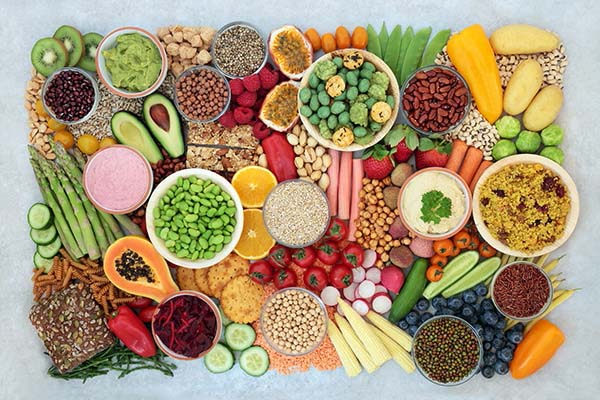3 Plant Based Beef Recipes That Will Impress Even Meat Lovers
3 Plant Based Beef Recipes That Will Impress Even Meat Lovers
Blog Article
All Regarding Healthy Food: Benefits of Taking On Plant Based Options
The discussion surrounding plant-based diets has acquired significant attention recently. Several people are discovering the possible health and wellness benefits, nutritional benefits, and ecological effects connected with these dietary choices. As individuals come to be a lot more conscious of their food's influence on health and sustainability, inquiries develop regarding the practicalities of taking on such a way of living. What certain modifications can one expect, and just how might these options reshape not just personal health yet likewise the planet's future?
Recognizing Plant-Based Diet Plans
Although numerous people connect plant-based diets mostly with vegetarianism or veganism, these diet plans can incorporate a large array of consuming patterns that focus on whole, minimally refined plant foods. Such diets commonly include fruits, veggies, entire grains, nuts, vegetables, and seeds, while limiting or removing pet products. This versatility permits individuals to tailor their nutritional choices according to dietary needs and personal preferences. Some might adopt a largely plant-based diet while still sometimes consuming meat or milk, frequently referred to as a flexitarian method. The emphasis remains on integrating even more plant foods, which can lead to a diverse selection of flavors and meals. Comprehending these numerous analyses of plant-based consuming is important for appreciating its access and allure in contemporary food culture.
Health And Wellness Perks of Plant-Based Foods
The wellness advantages of plant-based foods are substantial, using a nutrient thickness advantage that supports general health. Study shows that these foods can boost heart health and play a vital role in effective weight management. By integrating much more plant-based choices, individuals may improve their dietary options and promote long-term health.
Nutrient Density Advantage
Nutrient thickness plays an essential role in the health advantages of plant-based foods, making them an engaging option for those seeking a balanced diet. Plant-based foods, such as fruits, vegetables, beans, nuts, and entire grains, are usually abundant in necessary vitamins, minerals, and anti-oxidants while being lower in calories. This high nutrient density permits people to eat less calories while still satisfying their nutritional needs. In addition, these foods are loaded with nutritional fiber, promoting gastrointestinal health and aiding in weight monitoring. By integrating nutrient-dense plant-based choices, consumers can boost their general health, sustain their body immune systems, and decrease the threat of persistent conditions. Inevitably, the nutrient density of plant-based foods underscores their relevance in a health-conscious way of life.
Heart Health Renovation

Weight Management Support
Along with advertising heart health and wellness, a plant-based diet can substantially help in weight management. This nutritional approach stresses whole foods such as fruits, veggies, legumes, nuts, and entire grains, which are typically reduced in calories and higher in fiber contrasted to animal-based products. The high fiber web content helps boost satiety, minimizing overall calorie intake. Furthermore, plant-based diets are typically rich in essential nutrients while reduced in unhealthy fats, making it much easier to maintain a healthy weight. Plant Based Beef. Research study shows that individuals who embrace a plant-based way of living tend to have lower body mass indexes (BMIs) and experience even more effective weight reduction contrasted to those that eat meat-heavy diets. As a result, accepting plant-based alternatives is a strategic option for efficient weight monitoring
Nutritional Worth of Plant-Based Active Ingredients
Plant-based ingredients are rich in important nutrients, using a varied variety of vitamins, minerals, and anti-oxidants that add to total wellness. A contrast of healthy protein resources discloses that while pet items are commonly watched as superior, many plant-based options provide ample healthy protein and various other valuable substances. Comprehending the dietary value of these components can help individuals make informed nutritional selections.
Necessary Nutrients in Plants
Nutrient-rich active ingredients located in plants offer a varied array of important vitamins and minerals that contribute greatly to total health and wellness. These components are rich in vitamins A, C, and K, which sustain immune feature, vision, and blood clotting, respectively. Furthermore, plants offer essential minerals such as potassium, calcium, and magnesium, essential for heart health, muscular tissue function, and bone toughness. The visibility of fiber in plant-based foods aids food digestion and promotes a healthy digestive tract microbiome. Antioxidants, located generously click reference in veggies and fruits, help fight oxidative anxiety and reduce swelling. Furthermore, several plant foods are low in calories yet high in nutrients, making them an excellent selection for those seeking to preserve a healthy weight while making sure perfect nutrient consumption.
Contrasting Healthy Protein Resources
Protein sources vary substantially in their dietary accounts, with plant-based components providing distinct benefits. Unlike pet proteins, which typically include saturated fats and cholesterol, plant healthy proteins often tend to be lower in these unhealthy parts. Legumes, nuts, seeds, and entire grains are rich in crucial view publisher site amino acids, fiber, vitamins, and minerals. For example, lentils give high healthy protein content together with considerable iron and folate, while quinoa is a full healthy protein, offering all nine crucial amino acids. Additionally, plant-based healthy proteins are typically come with by anti-oxidants and phytochemicals that support general health. The shift to plant-based protein resources not just boosts dietary intake yet also straightens with lasting nutritional techniques, minimizing ecological impact and advertising long-term health benefits.
Ecological Impact of Plant-Based Eating
As awareness of environment adjustment expands, lots of people are checking out sustainable dietary options that can greatly reduce their environmental footprint. Plant-based consuming has actually become a significant contributor to decreasing greenhouse gas emissions, which are largely related to livestock production. The growing of fruits, grains, vegetables, and beans commonly needs less resources, such as water and land, contrasted to animal farming. Additionally, plant-based diet regimens can lead to lowered logging, as much less land is needed for grazing livestock or expanding animal feed. By moving in the direction of plant-based alternatives, consumers can support biodiversity and promote healthier ecological communities. Generally, embracing plant-based eating not just advantages personal health however additionally stands for a crucial action towards environmental sustainability and conservation initiatives.
Conquering Common Misconceptions
While many people identify the benefits of a plant-based diet plan, numerous false impressions commonly hinder them from fully accepting this lifestyle. A common idea is that plant-based diets lack enough healthy protein; however, many plant resources, such as vegetables, nuts, and tofu, give enough protein. Additionally, some presume that this diet is expensive, when as a matter of fact, staples like beans, rice, and seasonal veggies can be rather inexpensive. An additional false impression is that plant-based eating is extremely limiting, whereas it really uses a varied range of foods and flavors. Lots of fret that a plant-based diet plan might lead to shortages, yet with correct preparation, individuals can obtain all necessary nutrients, including minerals and vitamins, while delighting in a large range of delicious meals. Broad Tips for Transitioning to a Plant-Based Way of life
Making the change to a plant-based lifestyle can be an enhancing experience, though it typically requires some advice to browse the first adjustments. Initially, individuals are motivated to begin slowly, incorporating even more fruits, vegetables, legumes, and entire grains into their dishes while lowering meat and dairy products intake. Dish planning is important; preparing a regular menu can aid alleviate the adjustment and avoid final unhealthy options. Discovering new dishes and cooking approaches can likewise enhance the experience and keep enjoyment concerning plant-based eating. Additionally, signing up with support system or areas can supply inspiration and share beneficial ideas. Staying notified regarding nourishment guarantees balanced meals, protecting against shortages while cultivating a healthy and balanced, enjoyable plant-based lifestyle.

Delicious Plant-Based Meal Ideas
Checking out tasty plant-based meal ideas can influence people to welcome a much more nourishing diet. One prominent alternative is a hearty quinoa salad, featuring cherry tomatoes, cucumber, and a tangy lemon-tahini dressing. One more fave is a tasty lentil stew, loaded with carrots, celery, and aromatic natural herbs, ideal for a comforting dinner. For breakfast, overnight oats made with almond milk, chia seeds, and topped with fresh berries offer a nutritious beginning to the day. Furthermore, a vibrant veggie stir-fry with tofu and a variety of colorful veggies can be a quick yet satisfying meal. Creamy avocado toast on whole-grain bread, sprinkled with seeds and flavors, offers a basic yet tasty treat. These meals display the variety and splendor of plant-based consuming.

Frequently Asked Concerns
Can a Plant-Based Diet Regimen Give Enough Protein?
The inquiry of whether a plant-based diet regimen can give adequate protein is usual. Numerous sources, Clicking Here consisting of beans, nuts, seeds, and entire grains, can meet healthy protein requires effectively, supporting a nutritious and well balanced diet plan for individuals.
Are Plant-Based Diet Plans Suitable for Kid?
The viability of plant-based diet plans for kids relies on careful planning. Appropriate nutrients must be guaranteed, including minerals, vitamins, and proteins. With appropriate assistance, such diets can sustain healthy and balanced development and development in youngsters.
How Do I Dine Out on a Plant-Based Diet?
Eating in restaurants on a plant-based diet regimen includes seeking dining establishments with diverse food selections, asking for alterations, and exploring vegan-friendly choices. Preparation in advance and communicating dietary preferences can enhance the eating experience while keeping dietary selections.
What Are Common Allergens in Plant-Based Foods?
Typical irritants in plant-based foods include soy, gluten, nuts, and seeds - Plant Based Beef. People following a plant-based diet plan should recognize these irritants and check out labels very carefully to avoid unfavorable reactions and ensure safe usage
Can Plant-Based Diets Assist With Weight-loss?
Study suggests that taking on a plant-based diet regimen may promote fat burning due to its generally lower calorie density and higher fiber content. This combination can boost satiety, helping individuals manage their calorie consumption effectively. Numerous people associate plant-based diets mainly with vegetarianism or veganism, these diet regimens can encompass a wide array of consuming patterns that focus on whole, minimally refined plant foods. Nutrient density plays an important role in the health benefits of plant-based foods, making them an engaging option for those seeking a balanced diet regimen. Plant-based diet regimens have been shown to considerably improve heart health, as they often have elements that support cardio function. In addition to advertising heart health and wellness, a plant-based diet plan can substantially assist in weight management. An usual idea is that plant-based diet plans lack sufficient healthy protein; nonetheless, numerous plant sources, such as beans, nuts, and tofu, offer ample healthy protein.
Report this page